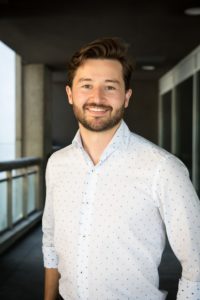
Peter Serles, who successfully defended his PhD thesis this month, was recently awarded a University of Toronto Student Leadership Award (UTSLA). This recognition honours students who, on top of their studies, provide impactful leadership and volunteerism for the betterment of the University of Toronto.
Peter received the UTLSA for his numerous contributions across multiple levels of the University, from The Department of Mechanical and Industrial Engineering (MIE) up to the President’s Office and Governing Council. He has served as the sole graduate student representative on the President’s Advisory Committee for the appointment of Vice-President and Provost of the University, and the Provost’s Advisory Committee for the appointment of Dean of the Faculty of Applied Science and Engineering. He has also served on the Graduate Student Advisory Committee for the Dean of the School of Graduate Studies, and Chaired the Graduate Student Committee for MIE’s self-study in 2022. This is on top of Peter’s MASc (1T9) and PhD (2T4) research supervised by Professor Tobin Filleter in the NanoMechanics and Materials Laboratory (NanoM2).
The Department of Mechanical and Industrial Engineering recently sat down with Peter, who was also a Vanier Scholar, Connaught PhDs for Public Impact Fellow, and Junior Fellow of Massey College, to learn more about his broader U of T experiences.
When you began graduate studies at MIE, what inspired you to get involved in FASE and U of T initiatives?
I’m passionate about how science can create impacts beyond the lab into the policy space, and ultimately for the betterment of public life across Canada. This began over six years ago when I started volunteering with the Canadian Science Policy Centre (CSPC) to help build relationships between scientists and policymakers at the federal level. I learned a lot about the Canadian science landscape, so I wanted to also help build my local community and shape University policies to make life better and more successful for graduate students. My graduate experience has been very positive, but I know that is not always the case for graduate students and I was excited to be involved in making structural changes so that everyone can access crucial tools and supports to succeed.
What initiative brought you the most sense of accomplishment?
At the start of my time as part of the Graduate Student Advisory Committee for the Dean of SGS, I kept pushing for how we could innovate and modernize graduate education. Many grad classes can go beyond the classroom to include modern teaching methods, but it’s not always the case and experiential learning is so valuable. After consulting with students, meeting with the Vice-Provost of Students for U of T, and Vice-Dean, Students for SGS, we created the Graduate Education Innovation Fund (GEIF) to provide seed funding for innovative teaching proposals. We realized that many professors are excited about innovation in teaching, but capacity or funding to enact their ideas is tough. In the three years since GEIF launched, we’ve funded proposals including VR surgery lessons, establishing a recording studio for student podcasts and production, and collaborations with the ROM for archive access in coursework. This project was so cool because I was able to see it all the way from a brainstorming session, to consultations, to a pilot project, and now to an established fund, that makes a tangible impact for student success across the University.
If students are interested in getting involved in these diverse initiatives, what is your advice?
Many, many things are happening across the University, and there are multiple ways to get involved – from joining Faculty Council to helping organize a local conference, we each play a role in building our local academic community. For me, I kind of stumbled into some of these initiatives, but I was captivated by how complex and intricate the decision making is in these roles, and I wanted to do everything that I could to build the community over my time here!
Along with being one of 18 U of T Engineering students who received a UTSLA Award, Peter is a PhD graduate with a research focus on nano-3D printed nanostructures and high-performance nanomaterials. He has published more than 25 peer-reviewed articles in journals including Nature and Science, was awarded 1st Prize for his presentations at the 2023 MIE Graduate Research Symposium and U of T Engineering Research Conference, and starts his post-doc position at Caltech this upcoming July.
-Published March 5, 2024 by Kendra Hunter